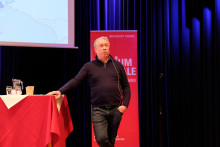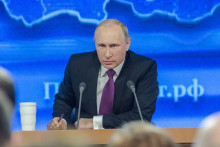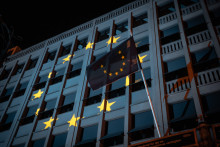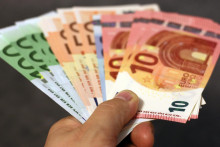Donnelly doesn’t think it will take too long for Finland to join NATO. ‘Both the public and the government are strongly in favour of joining. Sweden is a bit on the fence, but there is a cultural explanation for that. The Swedes are always a bit hesitant. They even have a special word for it, called Lagom, which basically means: not too fast, but slowly getting somewhere when things are just right.’
Should Finland and Sweden join NATO, that would definitely strengthen the alliance, says Donnelly. ‘And it would frustrate Putin, since it would mean that there are two less neutral states that he can be aggressive towards.’ Though the strength of NATO also depends on the upcoming French presidential elections, Donnelly argues. ‘It’s too close to call. Marine Le Pen has a campaign to sort of Make France Great Again, whatever that would mean. But France pulling out of NATO would definitely weaken the alliance. All in all, western unity has increased since the war in Ukraine, but it’s moving at a very slow pace.’
Different terrain
This slow pace does not help Ukraine’s need for fast action, now the Donbas region in the east of the country has become the focal point of the Russian invasion. ‘President Zelensky has been calling for better weaponry. And rightly so, considering that the terrain will be different than in the earlier stages of the war. While Ukraine has been very successful with a guerrilla-style warfare – hiding, fighting and running away, the terrain in the Donbas region is much more open with very few places to hide. This will mean that the advantage will tilt in favour of Russia.’
In addition to a numeral advantage in troops, Russia’s tactics will also focus on using heavy artillery and its air force, to punch holes in the Ukrainian defences, says Donnelly. ‘The Ukrainians know what needs to be done, but their decision will be based on the military resources they have. They need better weaponry, tanks and close air support, to tilt the advantage to their side.’
Dumb army
The UT researcher does see the Ukrainians fighting cleverly. ‘Just look at the number of Russian generals that have already been taken out by snipers. A lot of effort has been put in finding the grey-haired guys next to the antennas.’ A similar thing can be said about the sinking of the Moskva battleship. ‘It’s wasn’t just any missile cruiser, it was the command centre for the entire Russian fleet. The Ukrainians have been consciously attacking the nervous system of the Russian army – with success. I think we can conclude that the Russian army is a dumb army. Soldiers are trained to follow orders, not to take over tasks from superiors two ranks higher, like the US marines.’
The main focus is still on the strategically important port city Mariupol, sees Donnelly. ‘Against all odds, the resistance is still holding on, in a steel plant. An estimate of about 100.000 inhabitants are effectively living underground. The forces fighting are hugging their enemy: drawing them in, so they can’t fight someplace else, like in Donbas or recapturing Kherzon.’
He thinks two scenarios could unfold. ‘Either everybody dies, but they take as many as they can with them. But it is also possible that the defence will stand their ground, long enough for Ukrainian reinforcements to come in from behind, provided the Ukrainian military gets more equipment to use. A similar scenario unfolded in World War II, in Stalingrad, when the Russians were able to defeat the Germans that way. In a best-case scenario, Ukrainian Mariupol can become the new Stalingrad.’
Still, time is of the essence, says Donnelly. ‘They have a chance, as long as they stay and fight. But all depends on how long they can hold out and the support that may or may not be coming in. If there is a moment to upgrade military aid to Ukraine, it is now.’







